Key takeaways:
- Effective research habits involve understanding personal learning styles, organizing information systematically, and allowing for creativity through breaks.
- Thorough research enhances credibility and audience understanding, helping authors avoid misrepresentations and identify market trends.
- Setting clear research goals and adapting them as new insights emerge is crucial for a focused and efficient research process.
- Utilizing a mix of digital tools and community engagement can enrich research experiences and lead to unexpected breakthroughs.

Understanding effective research habits
Effective research habits are often rooted in a deep understanding of one’s own learning style. I remember struggling during my early writing days, sifting through mountains of information without a clear plan. It took time to realize that prioritizing my research focus significantly cut down on frustration. How often do we find ourselves overwhelmed by the sheer volume of available data? It’s essential to identify what specific questions we want to answer, guiding us in our search.
Another key aspect is the organization of information. I often use digital tools to create a system where I can categorize my findings. This approach allows me to trace my thought process and discover connections. I’ve learned that a well-structured outline can serve as both a roadmap and a foundation, which can be incredibly helpful when I revisit my notes. Have you ever tried organizing your research visually? It can transform chaotic notes into a coherent narrative.
Lastly, I’ve noticed that taking breaks during research enhances my creativity. During a focused session, I often write down key insights, then step away for a short walk. This simple act can lead to unexpected ideas blooming in my mind, reminding me that sometimes the best thoughts arise when we least expect them. Have you experienced a similar revelation when allowing your mind to wander? Embracing this gives us the freedom to think outside the box and enriches our work.
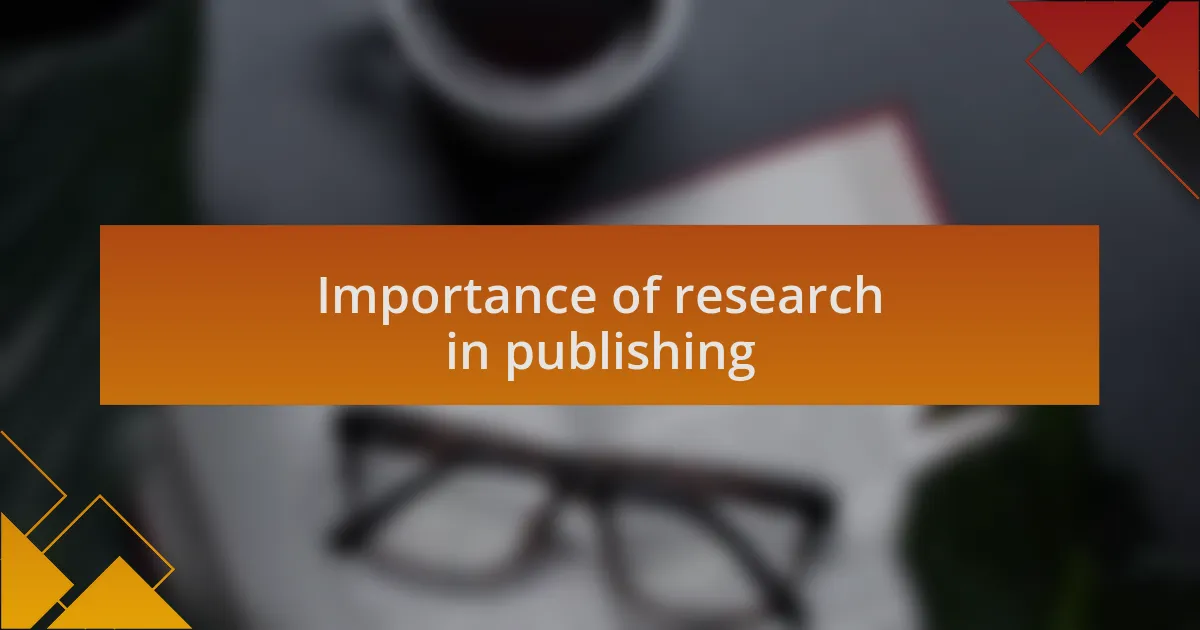
Importance of research in publishing
Research is the backbone of successful independent publishing. Without a solid foundation of information, authors can easily misrepresent topics or overlook significant trends. I recall a project where I neglected thorough research, only to realize later that I had misinterpreted crucial industry shifts. This experience taught me that comprehensive research not only enhances credibility but also builds trust with readers.
Delving into various sources is vital in understanding the market and audience needs. I often look beyond just books; articles, reviews, and even social media feedback can provide invaluable insights into what resonates with readers. Have you ever stumbled upon an unexpected source that completely changed your perspective? It’s those serendipitous discoveries that frequently lead to unique angles and richer narratives.
Moreover, I’ve found that effective research can illuminate potential pitfalls in publishing. During my early days, I launched a book without fully grasping the competitive landscape. The aftermath was a reality check. Now, I emphasize researching not just what works, but also why certain strategies fail. Isn’t it fascinating how much we can learn from both successes and setbacks? Embracing this dual approach allows for a more nuanced understanding of the publishing world.
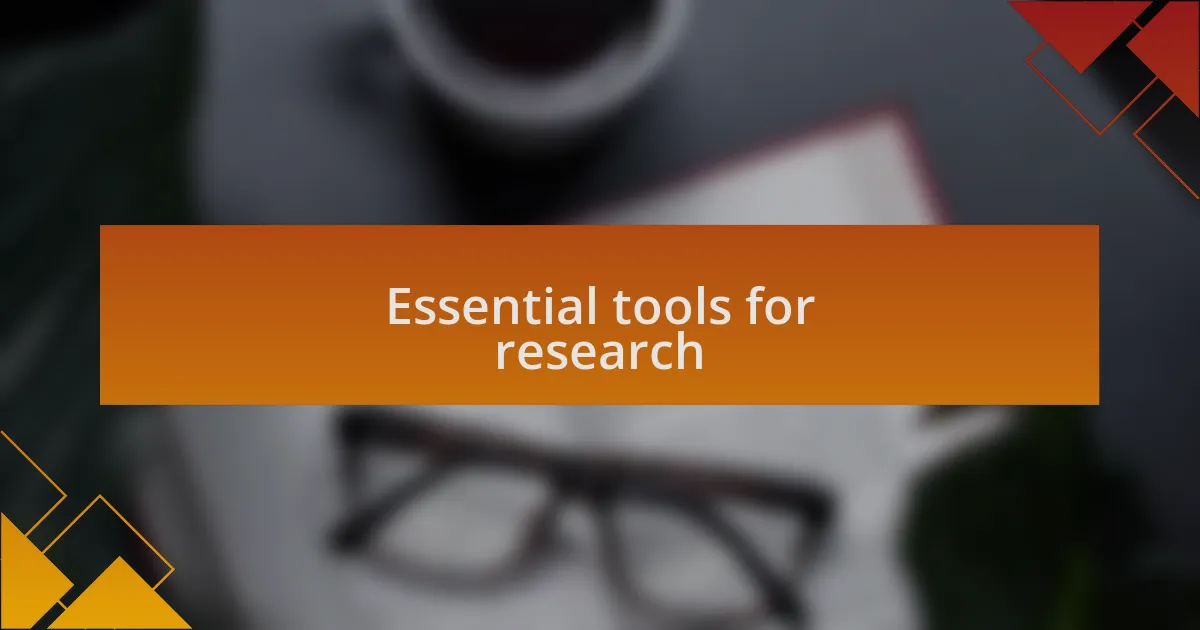
Essential tools for research
When it comes to research tools, I’ve found that a combination of traditional and digital resources works wonders. For instance, I often lean on academic databases like JSTOR and Google Scholar for in-depth studies, particularly when I need to support a specific claim or theory. Last month, I was working on a piece about the evolution of self-publishing, and those platforms offered rich, authoritative insights that truly enriched my understanding.
Another essential tool in my research arsenal is the use of content aggregation websites such as Feedly. This tool allows me to curate articles from various publishing blogs and news outlets, making it easier to stay updated on industry trends. I remember discovering a crucial article about the rise of audiobooks through Feedly that completely shifted my approach to marketing a book I was about to release. Have you ever found that one piece of information that suddenly clicks and changes everything for you?
Lastly, let’s not forget the power of community-driven platforms like Reddit or specialized forums. Engaging in discussions and asking questions can reveal perspectives that might otherwise slip through the cracks. I vividly recall a conversation in a writing subreddit where an author shared their mistakes about eBook formats. That exchange not only saved me from potential pitfalls but also served as a reminder of just how valuable peer insights can be in the research process. Isn’t it remarkable how interactive communities can become a goldmine of knowledge?
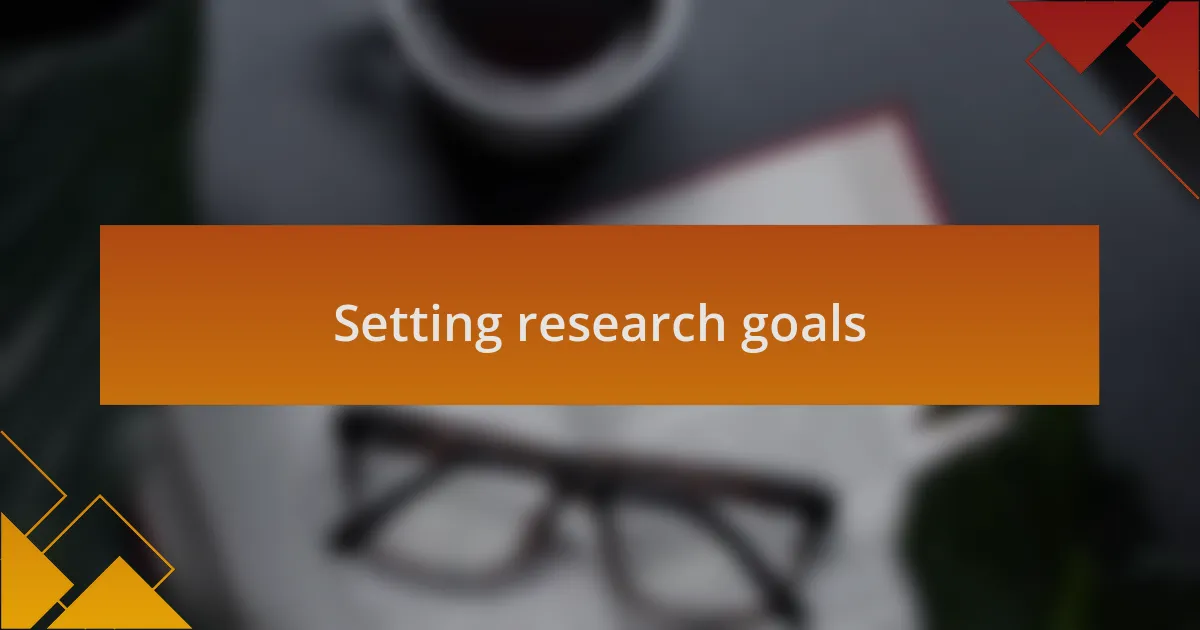
Setting research goals
Setting research goals is a crucial step that shapes the trajectory of your project. I often start by pinpointing what I specifically want to learn, whether it’s trends, historical context, or industry standards. By defining clear and focused objectives, I’ve found it much easier to navigate the vast sea of information out there. Have you noticed how vague goals can lead to scattered efforts?
As I delve deeper into a project, I prioritize my research questions based on urgency and relevance. For instance, when I was working on a book about independent authorship, figuring out the right audience was essential. I set a goal to gather insights on reader demographics and preferences, which ultimately guided my marketing strategy. This approach not only streamlined my research process but also kept me motivated as I achieved mini-milestones along the way.
I’ve learned that it’s helpful to review and adjust my goals as I progress. Sometimes, the initial questions I bring to the table don’t yield the insights I expect. In those instances, I reflect on the research I’ve done and ask myself: What gaps do I still need to fill? This kind of flexibility in setting goals ensures that I stay flexible and adaptable, turning potential setbacks into opportunities for deeper exploration. How do you adapt your goals in response to new discoveries?
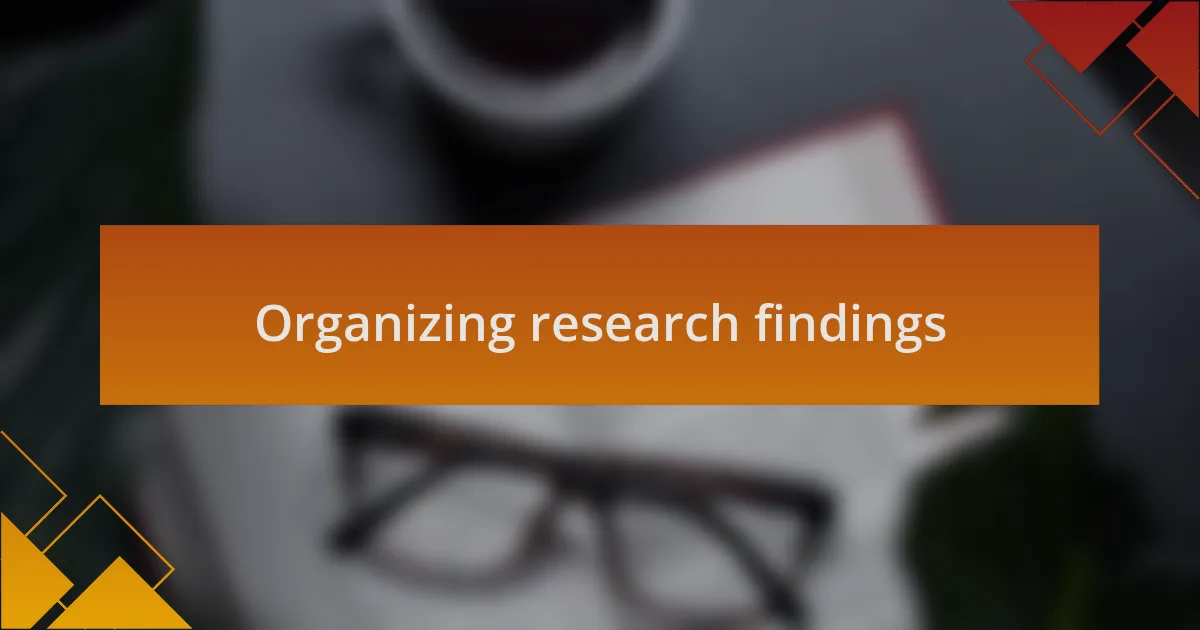
Organizing research findings
When it comes to organizing research findings, I like to use a system that makes sense to me. I often categorize the information by themes or topics, which allows me to see connections more easily. For example, while gathering insights for my latest project, I created folders labeled by chapter sections. It made retrieval simple and efficient when I was drafting.
I remember one particular instance when I was overwhelmed by my notes—so many ideas jumbled together! I decided to create a visual mind map that connected various concepts I was exploring. This not only clarified my thoughts but also ignited a sense of creativity. Have you ever tried mapping out your findings in such a way? It’s amazing how visual tools can expand your understanding.
Another tactic I’ve found effective is using digital tools coupled with traditional methods. I merge apps like Evernote for quick jotting down of ideas with a physical notebook for deeper reflections. This combination enriches my research experience, allowing me to engage in both spontaneous inspiration and thorough analysis. What methods do you favor for keeping your findings organized?
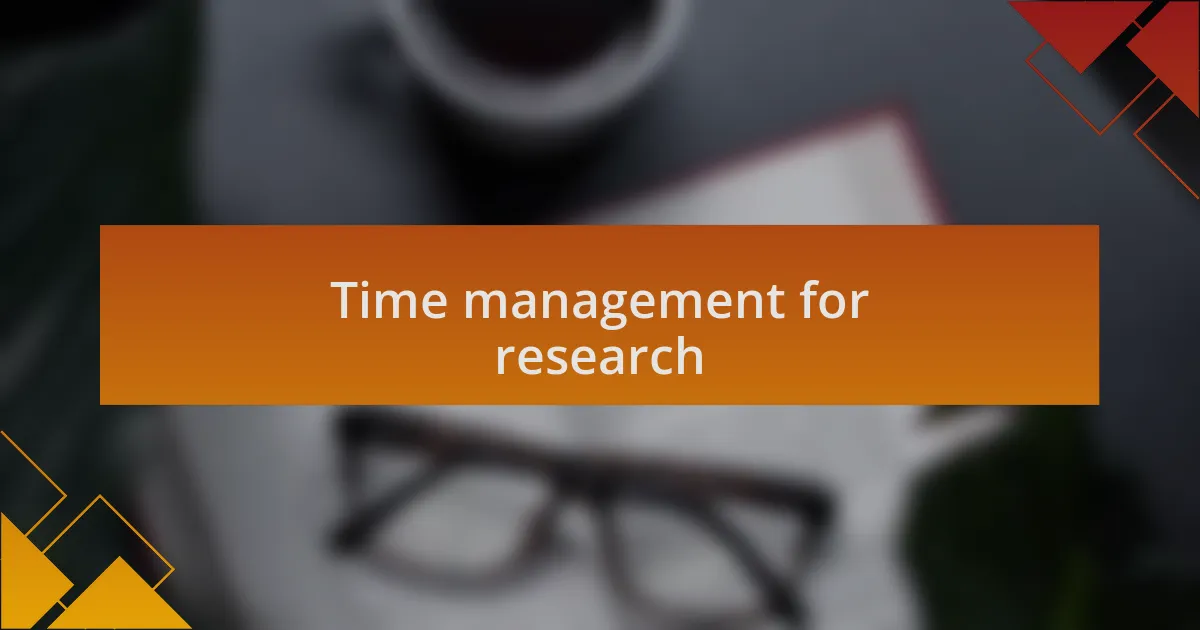
Time management for research
When it comes to time management for research, I find it vital to set specific goals for each session. For instance, if I plan to spend two hours researching a topic, I’ll break it down into manageable chunks—like dedicating the first hour to gathering sources and the second hour to analysis. This approach keeps me focused and prevents burnout. Have you ever noticed how easy it is to lose track of time when you dive deep into a subject? Setting a timer can be a game-changer in maintaining that balance.
I once faced a tight deadline on a project, and I realized that effective time management wasn’t just about being organized; it was about prioritizing tasks. I began my research by identifying the most critical questions that needed answers first. This clear hierarchy allowed me to focus on what truly mattered instead of getting lost in the details. Have you ever tried prioritizing your research tasks? It might help you uncover that essential information faster than you think.
Additionally, I recommend scheduling regular breaks during long research sessions. I discovered that stepping away from my desk for short intervals helped to refresh my mind and reignite my creativity. Whether it’s taking a quick walk or making a cup of tea, these breaks can often lead to unexpected insights or solutions. Have you experienced a creative breakthrough after a break? It’s fascinating how a little distance can enhance clarity in our work.
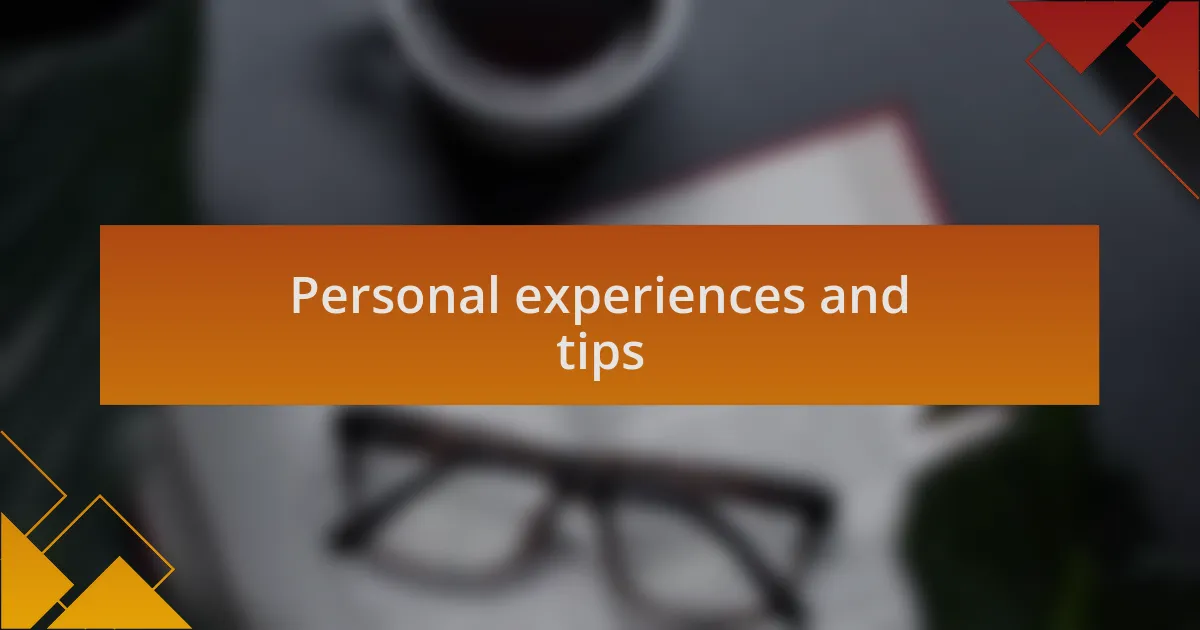
Personal experiences and tips
When it comes to research, I’ve learned that taking notes effectively is crucial. Early on, I struggled to keep track of where I found certain bits of information. It was frustrating to have great insights but no clue about their source. Now, I always note the source alongside key points, and I even use citation management software to keep everything organized. Have you tried different note-taking methods? You might discover one that transforms how you capture and retain information.
During one of my research projects, I stumbled upon an unexpected secondary source that completely reframed my perspective on the topic. Instead of focusing solely on my initial plan, I let curiosity guide me. This instinct not only enriched my research but also made the process more enjoyable. Have you ever followed a tangent in your research and found something that added depth to your understanding?
I’ve also found that engaging with others can significantly enhance my research. By discussing my findings with peers or mentors, I gain fresh perspectives that I might have overlooked. One memorable instance was a brainstorming session that led to a breakthrough in my argument structure. Have you considered reaching out for feedback on your research? Collaboration often opens doors to insights you wouldn’t uncover alone.